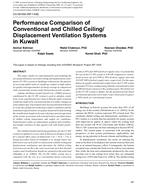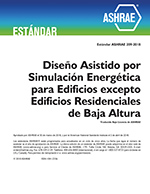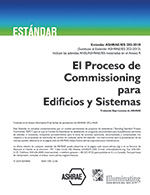Description
This paper is based on findings resulting from ASHRAE Research Project RP-1438.
This paper studies by experimentation and modeling the use and performance of cooled ceiling and displacement ventilation (CC/DV) systems to buildings in Kuwait for the purpose of assessing added value in satisfying comfort at high indoor air quality and opportunities of energy savings in comparison with conventional systems under Kuwait hot and dry weather.
A plume-multilayer model [Ayoub et al., (2008)] of spaces conditioned by the CC/DV system is used to simulate conditions of an experimental test room in Kuwait under transient conditions induced by external load due to weather changes in a hot summer day. Experiments have been performed in Kuwait to verify the satisfaction of thermal comfort conditions and the attainment of good indoor air quality measured by determining the stratification height in the space during transient operation of the system associated with external load at specified values of chilled ceiling temperature and supply air conditions. Experimental results on temperature gradient and stratification height variation in time agreed well with model predictions.
The validated model and design guidelines for the CC/DV system are applied to a case study in Kuwait to design a system for a typical office space of dimensions 5 m × 10 m × 3 m. A design procedure based on Ghaddar et al. design charts was followed to size each of the two subsystems (chilled ceiling and displacement ventilation) and determine the chilled ceiling load removal ratio R to the total room load such that thermal comfort and stratification height are attained at the peak load [Ghaddar et al. (2008)]. The CC/DV chiller system size is compared with the size of a conventional mixed convection system at 30% and 100% fresh air supply ratios. It is found that the size of the CC/DV system is 9.69 kW compared to conventional system size of 6.9 kW at 30% fresh air supply ratio and 19.8 kW 100% fresh air supply ratio, respectively. For the same indoor air quality and thermal comfort level, the CC/DV system consumed 53% less cooling energy than the conventional system at 100% fresh air system over the cooling season. The initial cost of the CC/DV system is higher, but the payback period based on transient operation is less than 3 years when used to replace a 100% fresh air conventional system.
Units: SI
Citation: ASHRAE Transactions, vol. 115, pt. 1, Chicago 2009
Product Details
- Published:
- 2009
- Number of Pages:
- 8
- File Size:
- 1 file , 2 MB
- Product Code(s):
- D-CH-09-059




